Position Ppaper(立场文件)英文简介及模板
- 格式:doc
- 大小:35.50 KB
- 文档页数:3
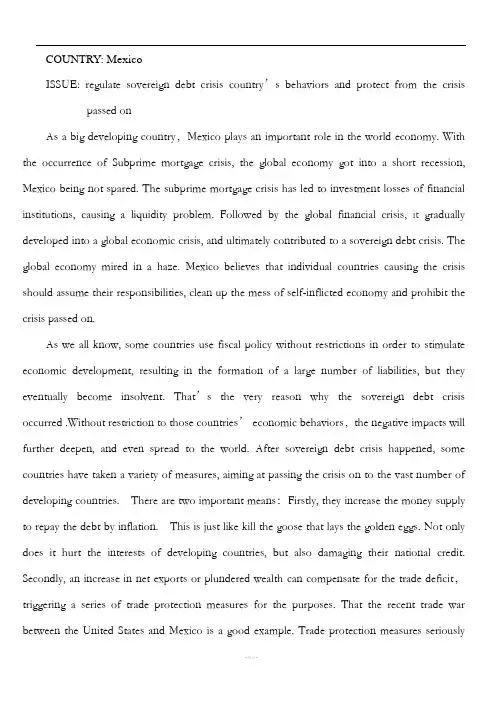
COUNTRY: MexicoISSUE: regulate sovereign debt crisis country’s behaviors and protect from the crisis passed onAs a big developing country,Mexico plays an important role in the world economy. With the occurrence of Subprime mortgage crisis, the global economy got into a short recession, Mexico being not spared. The subprime mortgage crisis has led to investment losses of financial institutions,causing a liquidity problem. Followed by the global financial crisis,it gradually developed into a global economic crisis, and ultimately contributed to a sovereign debt crisis. The global economy mired in a haze. Mexico believes that individual countries causing the crisis should assume their responsibilities, clean up the mess of self-inflicted economy and prohibit the crisis passed on.As we all know, some countries use fiscal policy without restrictions in order to stimulate economic development, resulting in the formation of a large number of liabilities, but they eventually become insolvent. That’s the very reason why the sovereign debt crisis occurred .Without restriction to those countries’ economic behaviors,the negative impacts will further deepen, and even spread to the world. After sovereign debt crisis happened, some countries have taken a variety of measures, aiming at passing the crisis on to the vast number of developing countries. There are two important means:Firstly, they increase the money supply to repay the debt by inflation. This is just like kill the goose that lays the golden eggs. Not only does it hurt the interests of developing countries, but also damaging their national credit. Secondly, an increase in net exports or plundered wealth can compensate for the trade deficit,triggering a series of trade protection measures for the purposes. That the recent trade war between the United States and Mexico is a good example. Trade protection measures seriouslyprejudice the economic interests of many countries, including Mexico. Also,regardless of opposition from quite many countries,The European Union levies unilaterally aviation carbon tax.As a responsible and developing country, Mexico responds to the impact of the crisis actively. Mexico thinks that primary mission to stable finance is to increase national foreign exchange reserves, foreign exchange market's stability, and restore to the confidence of international investment to Mexico. By last weekend (June 18), Mexico's foreign exchange reserves have risen up to $100.096 billion, a new record. This is the first time that its data statistics have broken through the $100 billion mark. Since this year, with the economy gradually recovering from the crisis, the foundation of Mexico's foreign exchange reserves constantly becomes more and more solid . This year from January to the end of May, the foreign exchange reserves of Mexico were $92.555 billion, $94.469 billion, $95.682 billion, $97.402 billion and $97.994 billion. What’s more ,to deal with the European Union in the aviation carbon taxes collected compulsively, Mexico 、China、the United States、Russia and India totaled 23 countries have signed "Moscow" declaration, boycotting the EU's "overlord system", to find a new path in order to promote the global aviation emissions.In order to cope with the sovereign debt crisis impact, Mexico puts forward the following Suggestions:1. The sovereign debt crisis countries should unify knowing, taking deficit into control to acertain degree;2. Reduce all forms of trade protectionism, promote the international economic interactionand cooperation;3. The sovereign debt crisis countries should formulate the standard monetary policyregulation, eliminating any form of paying debts by increasing money supply;4. Build a Developing Country Financial Stability Fund, preventing national wealth evaporation triggered by financial crisis caused by all kinds of speculation which is similar to Thailand.。
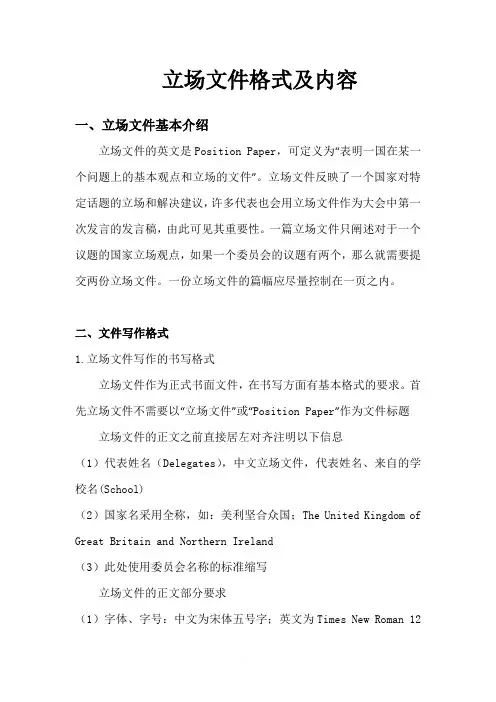
立场文件格式及内容一、立场文件基本介绍立场文件的英文是Position Paper,可定义为“表明一国在某一个问题上的基本观点和立场的文件”。
立场文件反映了一个国家对特定话题的立场和解决建议,许多代表也会用立场文件作为大会中第一次发言的发言稿,由此可见其重要性。
一篇立场文件只阐述对于一个议题的国家立场观点,如果一个委员会的议题有两个,那么就需要提交两份立场文件。
一份立场文件的篇幅应尽量控制在一页之内。
二、文件写作格式1.立场文件写作的书写格式立场文件作为正式书面文件,在书写方面有基本格式的要求。
首先立场文件不需要以“立场文件”或“Position Paper”作为文件标题立场文件的正文之前直接居左对齐注明以下信息(1)代表姓名(Delegates),中文立场文件,代表姓名、来自的学校名(School)(2)国家名采用全称,如:美利坚合众国;The United Kingdom of Great Britain and Northern Ireland(3)此处使用委员会名称的标准缩写立场文件的正文部分要求(1)字体、字号:中文为宋体五号字;英文为Times New Roman 12号字(2)行距:单倍(3)页边距:上下左右各2.54cm,(4)篇幅:总长度不超过2页A4纸例:学校:****国家:尼日利亚委员会:联合国高级难民署(历史委员会)议题:印尼海啸难民问题代表:****2004年12月26日,苏门答腊岛发生40年来最严重的9级大地震,引发超级大海啸,即使是远至东非也受到波及。
海啸掀起的滔天巨浪高达10米,13个印度洋国家的21万6000多条人命就这样消失在惊涛骇浪中,有的至今仍生死未卜。
这次的印度尼西亚海啸成为了近几十年来最大的一场自然灾难之一,联合国公布死难者数字是至少22万3000人,此外,多国沿岸的酒店和村庄城镇也受到严重破坏,180万人无家可归,经济损失近百亿美元.尼日利亚一直秉承着“不结盟、睦邻友好和以本国利益为中心”的多元化外交政策高度关注印尼海啸难民问题,已经就“印尼海啸难民问题”开展了国际人道主义援助,无偿提供了100万美元的救援资金,并且非常愿意在本国承受范围之内以“不强制遣返,保证难民基本生活”为原则接受部分难民,希望在印尼海啸难民问题中能发挥积极作用。
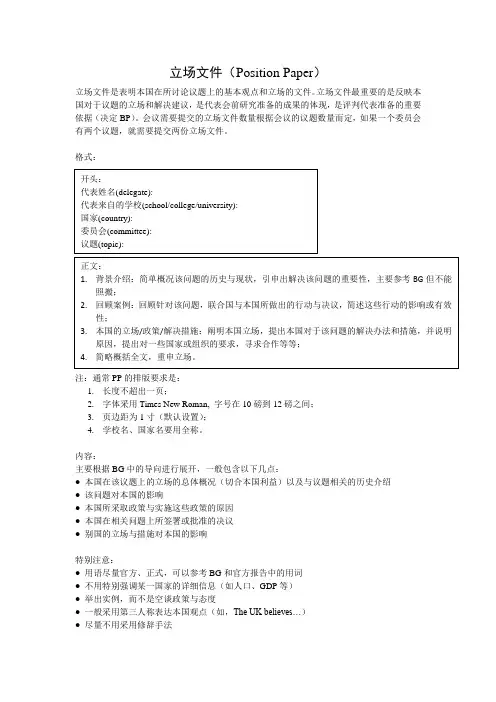
立场文件(Position Paper)
立场文件是表明本国在所讨论议题上的基本观点和立场的文件。
立场文件最重要的是反映本国对于议题的立场和解决建议,是代表会前研究准备的成果的体现,是评判代表准备的重要依据(决定BP)。
会议需要提交的立场文件数量根据会议的议题数量而定,如果一个委员会有两个议题,就需要提交两份立场文件。
格式:
注:通常PP的排版要求是:
1.长度不超出一页;
2.字体采用Times New Roman, 字号在10磅到12磅之间;
3.页边距为1寸(默认设置);
4.学校名、国家名要用全称。
内容:
主要根据BG中的导向进行展开,一般包含以下几点:
● 本国在该议题上的立场的总体概况(切合本国利益)以及与议题相关的历史介绍
●该问题对本国的影响
●本国所采取政策与实施这些政策的原因
●本国在相关问题上所签署或批准的决议
●别国的立场与措施对本国的影响
特别注意:
● 用语尽量官方、正式,可以参考BG和官方报告中的用词
● 不用特别强调某一国家的详细信息(如人口、GDP等)
● 举出实例,而不是空谈政策与态度
● 一般采用第三人称表达本国观点(如,The UK believes…)
● 尽量不用采用修辞手法。
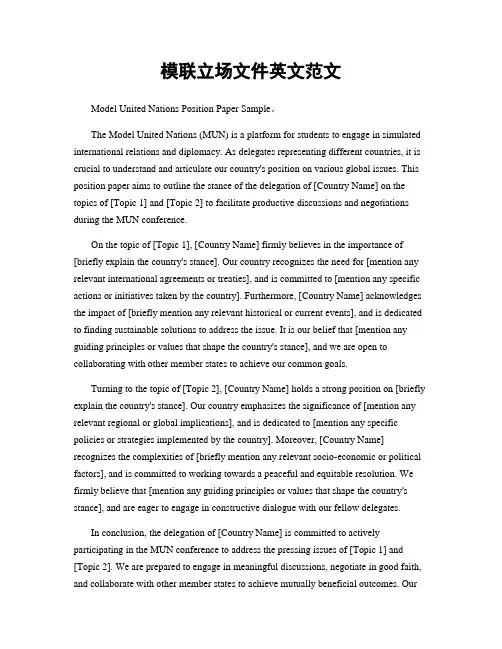
模联立场文件英文范文Model United Nations Position Paper Sample。
The Model United Nations (MUN) is a platform for students to engage in simulated international relations and diplomacy. As delegates representing different countries, it is crucial to understand and articulate our country's position on various global issues. This position paper aims to outline the stance of the delegation of [Country Name] on the topics of [Topic 1] and [Topic 2] to facilitate productive discussions and negotiations during the MUN conference.On the topic of [Topic 1], [Country Name] firmly believes in the importance of [briefly explain the country's stance]. Our country recognizes the need for [mention any relevant international agreements or treaties], and is committed to [mention any specific actions or initiatives taken by the country]. Furthermore, [Country Name] acknowledges the impact of [briefly mention any relevant historical or current events], and is dedicated to finding sustainable solutions to address the issue. It is our belief that [mention any guiding principles or values that shape the country's stance], and we are open to collaborating with other member states to achieve our common goals.Turning to the topic of [Topic 2], [Country Name] holds a strong position on [briefly explain the country's stance]. Our country emphasizes the significance of [mention any relevant regional or global implications], and is dedicated to [mention any specific policies or strategies implemented by the country]. Moreover, [Country Name] recognizes the complexities of [briefly mention any relevant socio-economic or political factors], and is committed to working towards a peaceful and equitable resolution. We firmly believe that [mention any guiding principles or values that shape the country's stance], and are eager to engage in constructive dialogue with our fellow delegates.In conclusion, the delegation of [Country Name] is committed to actively participating in the MUN conference to address the pressing issues of [Topic 1] and [Topic 2]. We are prepared to engage in meaningful discussions, negotiate in good faith, and collaborate with other member states to achieve mutually beneficial outcomes. Ourcountry's stance is rooted in [mention any guiding principles or values], and we are dedicated to contributing to the collective efforts of the international community.In the spirit of diplomacy and cooperation, we look forward to the MUN conference and the opportunity to work together towards a better future for all nations.Thank you.。
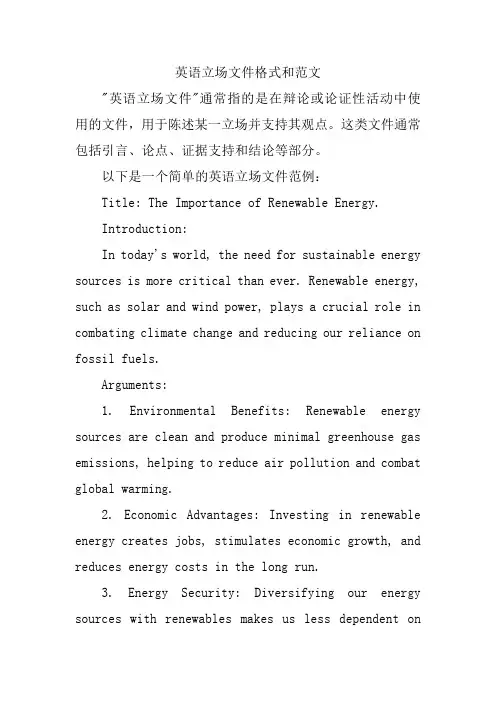
英语立场文件格式和范文"英语立场文件"通常指的是在辩论或论证性活动中使用的文件,用于陈述某一立场并支持其观点。
这类文件通常包括引言、论点、证据支持和结论等部分。
以下是一个简单的英语立场文件范例:Title: The Importance of Renewable Energy.Introduction:In today's world, the need for sustainable energy sources is more critical than ever. Renewable energy, such as solar and wind power, plays a crucial role in combating climate change and reducing our reliance on fossil fuels.Arguments:1. Environmental Benefits: Renewable energy sources are clean and produce minimal greenhouse gas emissions, helping to reduce air pollution and combat global warming.2. Economic Advantages: Investing in renewable energy creates jobs, stimulates economic growth, and reduces energy costs in the long run.3. Energy Security: Diversifying our energy sources with renewables makes us less dependent onimported fossil fuels, enhancing energy security.Evidence:According to a report by the International Energy Agency, renewable energy is set to surpass coal as the largest source of electricity by 2025.Studies have shown that transitioning to renewable energy could prevent thousands of premature deaths related to air pollution each year.Conclusion:In conclusion, the shift towards renewable energy is not just a choice but a necessity for a sustainable future. By embracing clean energy solutions, we can create a healthier planet and a more prosperous society for generations to come.中文翻译:可再生能源的重要性。
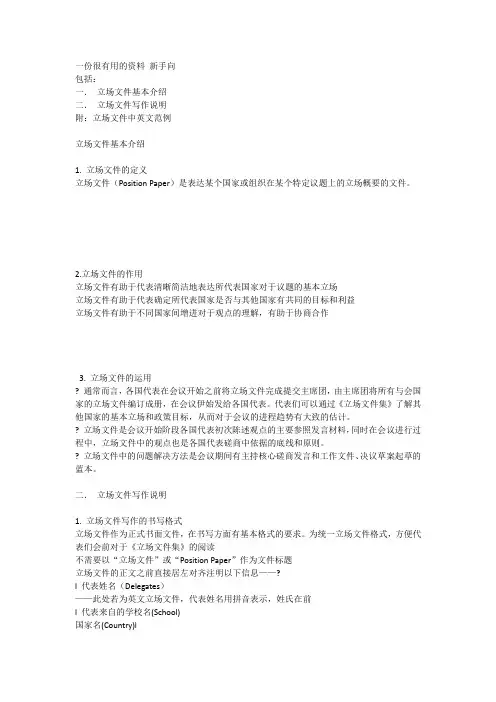
一份很有用的资料新手向包括:一.立场文件基本介绍二.立场文件写作说明附:立场文件中英文范例立场文件基本介绍1. 立场文件的定义立场文件(Position Paper)是表达某个国家或组织在某个特定议题上的立场概要的文件。
2.立场文件的作用立场文件有助于代表清晰简洁地表达所代表国家对于议题的基本立场立场文件有助于代表确定所代表国家是否与其他国家有共同的目标和利益立场文件有助于不同国家间增进对于观点的理解,有助于协商合作3. 立场文件的运用? 通常而言,各国代表在会议开始之前将立场文件完成提交主席团,由主席团将所有与会国家的立场文件编订成册,在会议伊始发给各国代表。
代表们可以通过《立场文件集》了解其他国家的基本立场和政策目标,从而对于会议的进程趋势有大致的估计。
? 立场文件是会议开始阶段各国代表初次陈述观点的主要参照发言材料,同时在会议进行过程中,立场文件中的观点也是各国代表磋商中依据的底线和原则。
? 立场文件中的问题解决方法是会议期间有主持核心磋商发言和工作文件、决议草案起草的蓝本。
二.立场文件写作说明1. 立场文件写作的书写格式立场文件作为正式书面文件,在书写方面有基本格式的要求。
为统一立场文件格式,方便代表们会前对于《立场文件集》的阅读不需要以“立场文件”或“Position Paper”作为文件标题立场文件的正文之前直接居左对齐注明以下信息——?l 代表姓名(Delegates)——此处若为英文立场文件,代表姓名用拼音表示,姓氏在前l 代表来自的学校名(School)国家名(Country)l——国家名采用全称,如:美利坚合众国;The United Kingdom of Great Britain and Northern Irelandl 所在委员会(Committee)——此处使用委员会名称的标准缩写议题(Topic)l? 立场文件的正文部分要求——字体、字号:中文为宋体五号字;英文为Times New Roman 12号字(一说11号也行)ll 行距:单倍页边距:上下左右各2.54cm,l篇幅:总长度不超过2页A4纸l2. 立场文件写作的内容安排2.1 基本内容立场文件正文内容的标准格式,一般分为以下三个部分:背景介绍?背景介绍部分篇幅最短,简单概括议题涉及问题的发生背景、解决的重要性、解决的进展情况。
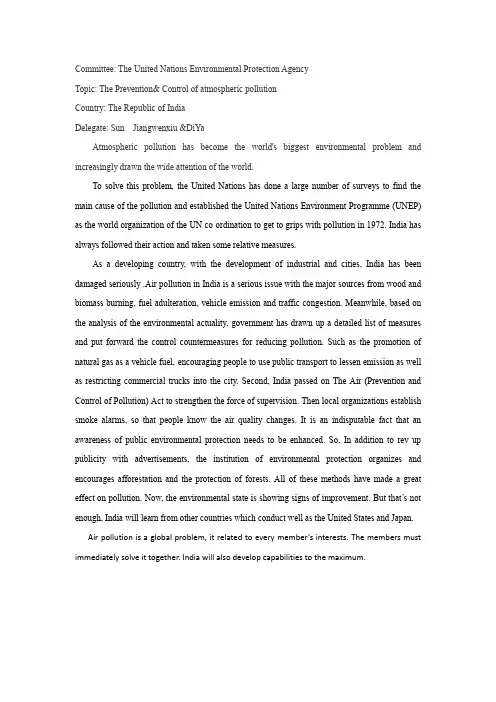
Committee: The United Nations Environmental Protection AgencyTopic: The Prevention& Control of atmospheric pollutionCountry: The Republic of IndiaDelegate: Sun Jiangwenxiu&DiYaAtmospheric pollution has become the world's biggestenvironmental problemand increasingly drawn the wide attention of the world.To solve this problem, the United Nations has done a large number of surveys to find the main cause of the pollution and established the UnitedNationsEnvironmentProgramme (UNEP) as the world organization of the UNco-ordination to get to grips with pollution in 1972.India has always followed their action and taken some relative measures.As a developing country, with the development of industrial and cities, India has been damaged seriously .Air pollution in India is a serious issue with the major sources fromwood and biomass burning, fuel adulteration, vehicle emission and traffic congestion.Meanwhile, based on the analysis of the environmental actuality, government has drawn up a detailed list of measuresand put forward the control countermeasures for reducing pollution. Such as the promotion of natural gas as a vehicle fuel,encouraging people to use public transport to lessen emissionas well as restricting commercial trucks into the city.Second, India passed onThe Air (Prevention and Control of Pollution) Act to strengthen the force of supervision. Then local organizations establish smoke alarms, so that people know the air quality changes. It is an indisputable fact that an awareness of public environmental protection needs to be enhanced.So, In addition to rev up publicity with advertisements, the institution of environmental protectionorganizes and encourages afforestation and the protection of forests. All of these methods have made a great effect on pollution. Now, the environmental state is showing signs of improvement. But that’s not enough, India will learn from other countries which conduct well as the United States and Japan.Air pollution is a global problem, it related to every member’s interests. The members must immediately solve it together. India will also develop capabilities to the maximum.。
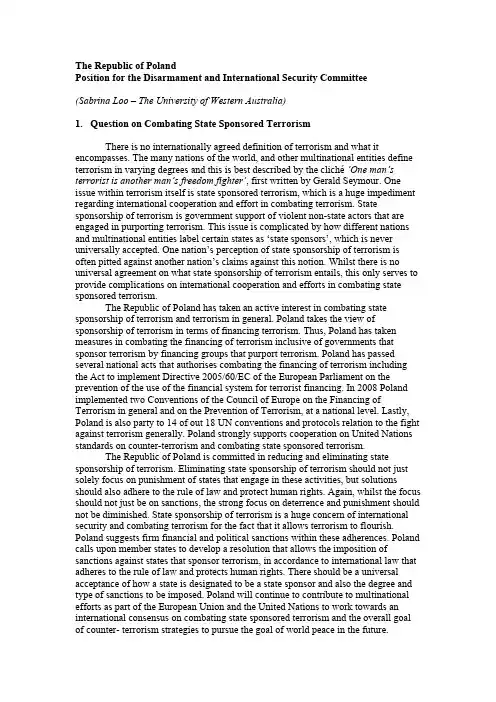
Position for the Disarmament and International Security Committee (Sabrina Loo – The University of Western Australia)1.Question on Combating State Sponsored TerrorismThere is no internationally agreed definition of terrorism and what it encompasses. The many nations of the world, and other multinational entities define terrorism in varying degrees and this is best described by the cliché ‘One man’s terrorist is another man’s freedom fighter’, first written by Gerald Seymour. One issue within terrorism itself is state sponsored terrorism, which is a huge impediment regarding international cooperation and effort in combating terrorism. State sponsorship of terrorism is government support of violent non-state actors that are engaged in purporting terrorism. This issue is complicated by how different nations and multinational entities label certain states as ‘state sponsors’, which is never universally accepted. One nation’s perception of state sponsorship of terrorism is often pitted against another nation’s claims against this notion. Whilst there is no universal agreement on what state sponsorship of terrorism entails, this only serves to provide complications on international cooperation and efforts in combating state sponsored terrorism.The Republic of Poland has taken an active interest in combating state sponsorship of terrorism and terrorism in general. Poland takes the view of sponsorship of terrorism in terms of financing terrorism. Thus, Poland has taken measures in combating the financing of terrorism inclusive of governments that sponsor terrorism by financing groups that purport terrorism. Poland has passed several national acts that authorises combating the financing of terrorism including the Act to implement Directive 2005/60/EC of the European Parliament on the prevention of the use of the financial system for terrorist financing. In 2008 Poland implemented two Conventions of the Council of Europe on the Financing of Terrorism in general and on the Prevention of Terrorism, at a national level. Lastly, Poland is also party to 14 of out 18 UN conventions and protocols relation to the fight against terrorism generally. Poland strongly supports cooperation on United Nations standards on counter-terrorism and combating state sponsored terrorism.The Republic of Poland is committed in reducing and eliminating state sponsorship of terrorism. Eliminating state sponsorship of terrorism should not just solely focus on punishment of states that engage in these activities, but solutions should also adhere to the rule of law and protect human rights. Again, whilst the focus should not just be on sanctions, the strong focus on deterrence and punishment should not be diminished. State sponsorship of terrorism is a huge concern of international security and combating terrorism for the fact that it allows terrorism to flourish. Poland suggests firm financial and political sanctions within these adherences. Poland calls upon member states to develop a resolution that allows the imposition of sanctions against states that sponsor terrorism, in accordance to international law that adheres to the rule of law and protects human rights. There should be a universal acceptance of how a state is designated to be a state sponsor and also the degree and type of sanctions to be imposed. Poland will continue to contribute to multinational efforts as part of the European Union and the United Nations to work towards an international consensus on combating state sponsored terrorism and the overall goal of counter- terrorism strategies to pursue the goal of world peace in the future.Position for the Disarmament and International Security Committee2.Question on the Role of International Border Security in Times of ArmedConflict.The increase of armed conflict around the world has often led to conflict spilling across borders whether it is the conflict itself or the resulting effects of such conflicts. Conflicts may also be transnational, in that conflicts may have already begun across nations rather than between combatants located in a single nation. The spread of ISIS in the Middle East as well as the spread of Boko Haram serves to illustrate the shifting borders been nations as a result of weak border control as well as difficult geographical features. International border security involves securing and strengthening borders between nations in times of armed conflict, where borders between nations may be weakened. The issue of border security is further complicated by issues such as already existing border disputes between nations, and a lack of effective existing border mechanisms. It also should be noted that issues such as cross-border weapon smuggling, the movement of people across borders during conflicts and illicit smuggling of goods across borders. Strengthening international border security in times of armed conflict is a huge concern to international security and peace.The Republic of Poland faces this issue with a strong interest in how to strengthen international borders with an aim to curtail the illicit flow of goods and the spread of armed conflict across borders. The Republic of Poland has contributed to efforts by the European Union on this issue. Efforts by the European Union includes the development and application of the Global Approach to Migration and Mobility program as well as the strengthened role of the European Union border agency, FRONTEX. Whist these programs have a focus on borders within Europe, Poland hopes to use such experiences in addressing the wider problem of border security in other regions of the world, namely the Middle East and Africa. Poland supports cooperation with the United Nations and on an international scale to further contribute to programs to aim to strengthen internal borders in times of armed conflict.The Republic of Poland fully supports any measures that aim to strengthen international border security in times of armed conflict. The strengthening of borders is of utmost importance in the first instance to discourage the activities such as illicit flow of goods across borders and to also prevent armed conflict spilling over borders. Poland acknowledges that the United Nations has various existing activities that currently work to strengthen international borders. However Poland call for a solution where the efficiency of such work can be increased, where the duplication of efforts through various programs implemented by the United Nations and by other entities can be reduced. By bringing the different work in strengthening international borders under a single department, more effective and concentrated work can be performed and our goal of strong and secure borders between states can be realised. Poland also stressed the importance of international cooperation on this issue, to further better understanding between nations on border security. Poland will continue to work with the United Nations on this issue of border security, through the various programs in place already and also working towards a more effective structure in tackling this issue, and continue to support efforts of the European Union on strengthening border security.。
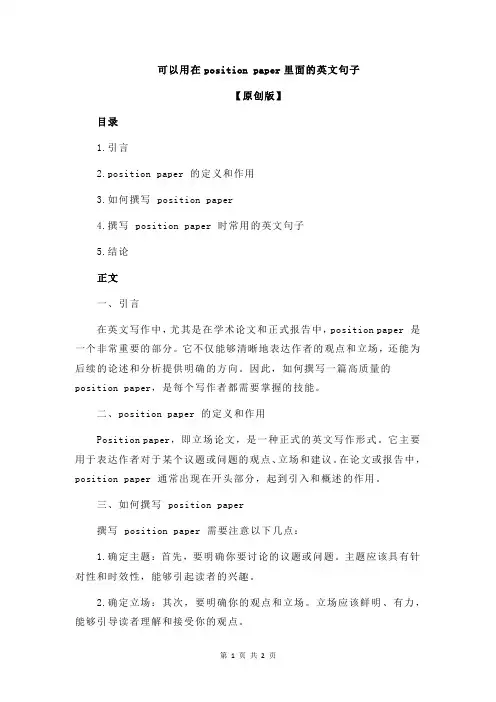
可以用在position paper里面的英文句子【原创版】目录1.引言2.position paper 的定义和作用3.如何撰写 position paper4.撰写 position paper 时常用的英文句子5.结论正文一、引言在英文写作中,尤其是在学术论文和正式报告中,position paper 是一个非常重要的部分。
它不仅能够清晰地表达作者的观点和立场,还能为后续的论述和分析提供明确的方向。
因此,如何撰写一篇高质量的position paper,是每个写作者都需要掌握的技能。
二、position paper 的定义和作用Position paper,即立场论文,是一种正式的英文写作形式。
它主要用于表达作者对于某个议题或问题的观点、立场和建议。
在论文或报告中,position paper 通常出现在开头部分,起到引入和概述的作用。
三、如何撰写 position paper撰写 position paper 需要注意以下几点:1.确定主题:首先,要明确你要讨论的议题或问题。
主题应该具有针对性和时效性,能够引起读者的兴趣。
2.确定立场:其次,要明确你的观点和立场。
立场应该鲜明、有力,能够引导读者理解和接受你的观点。
3.论证观点:然后,你需要通过事实、数据、理论等进行论证,以支持你的观点。
论证过程应该严谨、逻辑清晰,能够让读者信服。
4.提出建议:最后,你可以提出一些解决问题的建议或策略。
建议应该切实可行,能够对问题有所改善。
四、撰写 position paper 时常用的英文句子以下是一些在撰写 position paper 时常用的英文句子,供大家参考:1.The purpose of this position paper is to discuss the advantages and disadvantages of using social media in education.2.In my opinion, the government should invest more money in renewable energy sources such as solar and wind power.3.According to a recent study, more than 50% of the population agrees that climate change is one of the most pressing issues of our time.4.Despite the potential benefits, there are also some drawbacks to using artificial intelligence in the workplace.5.To address this problem, I suggest implementing stricter regulations and penalties for companies that violate environmental laws.五、结论总之,撰写 position paper 需要明确主题、立场,进行有力的论证,并提出切实可行的建议。
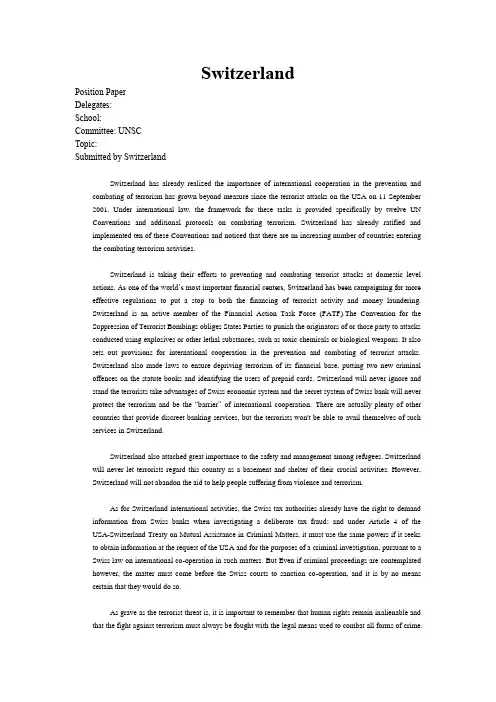
SwitzerlandPosition PaperDelegates:School:Committee: UNSCTopic:Submitted by SwitzerlandSwitzerland has already realized the importance of international cooperation in the prevention and combating of terrorism has grown beyond measure since the terrorist attacks on the USA on 11 September 2001. Under international law, the framework for these tasks is provided specifically by twelve UN Conventions and additional protocols on combating terrorism. Switzerland has already ratified and implemented ten of these Conventions and noticed that there are an increasing number of countries entering the combating terrorism activities.Switzerlandis taking their efforts to preventing and combating terrorist attacksat domestic level actions.As one of the world’s most important financial centers, Switzerland has been campaigning for more effective regulations to put a stop to both the financing of terrorist activity and money laundering.Switzerland is an active member of the Financial Action Task Force (FATF).The Convention for the Suppression of Terrorist Bombings obliges States Parties to punish the originators of or those party to attacks conducted using explosives or other lethal substances, such as toxic chemicals or biological weapons. It also sets out provisions for international cooperation in the prevention and combating of terrorist attacks.Switzerlandalso made laws to ensure depriving terrorism of its financial base, putting two new criminal offences on the statute books and identifying the users of prepaid cards. Switzerland will never ignore and stand the terrorists take advantages of Swiss economic system and the secret system of Swiss bank will never protect the terrorism and be the “barrier”of international cooperation.There are actually plenty of other countries that provide discreet banking services, but the terrorists won't be able to avail themselves of such services in Switzerland.Switzerland also attached great importance to the safety and management among refugees. Switzerland will never let terrorists regard this country as a basement and shelter of their crucial activities. However, Switzerland will not abandon the aid to help people suffering from violence and terrorism.As for Switzerland international activities, the Swiss tax authorities already have the right to demand information from Swiss banks when investigating a deliberate tax fraud; and under Article 4 of the USA-Switzerland Treaty on Mutual Assistance in Criminal Matters, it must use the same powers if it seeks to obtain information at the request of the USA and for the purposes of a criminal investigation, pursuant to a Swiss law on international co-operation in such matters.But Even if criminal proceedings are contemplated however, the matter must come before the Swiss courts to sanction co-operation, and it is by no means certain that they would do so.As grave as the terrorist threat is, it is important to remember that human rights remain inalienable and that the fight against terrorism must always be fought with the legal means used to combat all forms of crime.International humanitarian law must be applied in all situations and without exception by all parties to armed conflict and by private individuals too. The economic differencesbetween countries should also try to de eliminated.As always, the challenge will be to find a balance between the two competing interests, and to adopt a proportionate approach.Switzerland is committed to upholding these principles and to ensuring that international humanitarian law is applied more rigorously.http://www.ejpd.admin.ch//newscenter公报还说,瑞士不会容忍恐怖主义分子利用瑞士的金融系统,瑞士的银行保密制度不会保护恐怖主义,不会成为国际合作和刑事侦查的“障碍”。
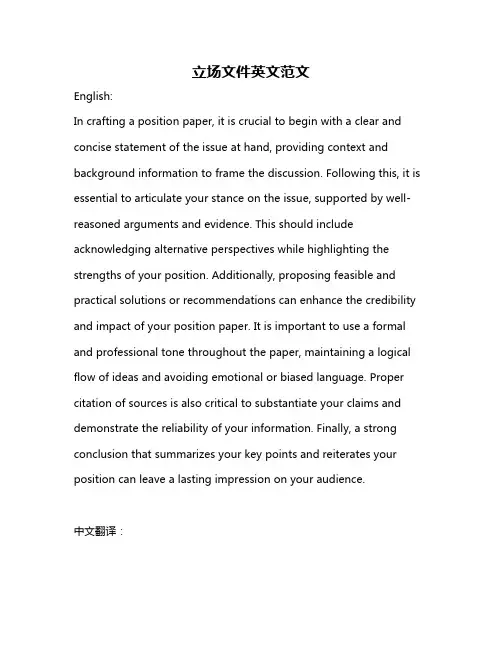
立场文件英文范文English:In crafting a position paper, it is crucial to begin with a clear and concise statement of the issue at hand, providing context and background information to frame the discussion. Following this, it is essential to articulate your stance on the issue, supported by well-reasoned arguments and evidence. This should include acknowledging alternative perspectives while highlighting the strengths of your position. Additionally, proposing feasible and practical solutions or recommendations can enhance the credibility and impact of your position paper. It is important to use a formal and professional tone throughout the paper, maintaining a logical flow of ideas and avoiding emotional or biased language. Proper citation of sources is also critical to substantiate your claims and demonstrate the reliability of your information. Finally, a strong conclusion that summarizes your key points and reiterates your position can leave a lasting impression on your audience.中文翻译:在撰写立场文件时,首先要明确并简洁地陈述所讨论的问题,提供背景信息和相关情境来构建讨论框架。
立场文件格式及容一、立场文件基本介绍立场文件的英文是Position Paper,可定义为“表明一国在某一个问题上的基本观点和立场的文件”。
立场文件反映了一个对特定话题的立场和解决建议,多代表也会用立场文件作为大会中第一次发言的发言稿,由此可见其重要性。
一篇立场文件只阐述对于一个议题的立场观点,如果一个委员会的议题有两个,那么就需要提交两份立场文件。
一份立场文件的篇幅应尽量控制在一页之。
二、文件写作格式1.立场文件写作的书写格式立场文件作为正式书面文件,在书写面有基本格式的要求。
首先立场文件不需要以“立场文件”或“Position Paper”作为文件标题立场文件的正文之前直接居左对齐注明以下信息(1)代表姓名(Delegates),中文立场文件,代表姓名、来自的学校名(School)(2)名采用全称,如:美利坚合众国;The United Kingdom of Great Britain and Northern Ireland(3)此处使用委员会名称的标准缩写立场文件的正文部分要求(1)字体、字号:中文为宋体五号字;英文为Times New Roman 12号字(2)行距:单倍(3)页边距:上下左右各2.54cm,(4)篇幅:总长度不超过2页A4纸例:学校:****:尼日利亚委员会:联合国高级难民署(历史委员会)议题:印尼海啸难民问题代表:****2004年12月26日,门答腊岛发生40年来最重的9级大地震,引发超级大海啸,即使是远至东非也受到波及。
海啸掀起的滔天巨浪高达10米,13个印度洋的21万6000多条人命就这样消失在惊涛骇浪中,有的至今仍生死未卜。
这次的印度尼西亚海啸成为了近几十年来最大的一场自然灾难之一,联合国公布死难者数字是至少22万3000人,此外,多国沿岸的酒店和村庄城镇也受到重破坏,180万人无家可归,经济损失近百亿美元.尼日利亚一直秉承着“不结盟、睦邻友好和以本国利益为中心”的多元化外交政策高度关注印尼海啸难民问题,已经就“印尼海啸难民问题”开展了国际人道主义援助,无偿提供了100万美元的救援资金,并且非常愿意在本国承受围之以“不强制遣返,保证难民基本生活”为原则接受部分难民,希望在印尼海啸难民问题中能发挥积极作用。
立场文件格式和范文Position Paper Format.A position paper is a document that presents a specific viewpoint on a controversial issue. It is typically written in a formal academic style and should be well-researched and well-argued.The following is a general format for a position paper:1. Introduction.State the issue and your position on it.Provide a brief overview of the key arguments that you will be making.2. Body.Present your arguments in a logical and organizedway.Use evidence to support your claims.Address potential counterarguments.3. Conclusion.Summarize your main arguments.Restate your position on the issue.Call to action (optional).Position Paper Sample.Issue: Should the United States adopt a single-payer healthcare system?Position: The United States should adopt a single-payer healthcare system.Introduction.The United States healthcare system is in need of reform. The current system is too expensive, too complex, and too inefficient. A single-payer healthcare system would address these problems by providing universal coverage, reducing costs, and simplifying the system.Body.Argument 1: Universal Coverage.A single-payer healthcare system would provide universal coverage to all Americans. This would mean that everyone would have access to the healthcare they need, regardless of their income or employment status. This would be a major improvement over the current system, which leaves millions of Americans uninsured or underinsured.Argument 2: Reduced Costs.A single-payer healthcare system would reduce costs forboth individuals and the government. The current system is inefficient and wasteful, and a single-payer system would eliminate many of the administrative costs that are currently driving up healthcare costs.Argument 3: Simplified System.A single-payer healthcare system would simplify the system for patients and providers. Patients would no longer have to deal with multiple insurance companies, and providers would no longer have to spend time and money on billing and paperwork. This would free up resources that could be used to provide better patient care.Conclusion.A single-payer healthcare system would provide universal coverage, reduce costs, and simplify the system. This would be a major improvement over the current system, and it would make healthcare more accessible and affordable for all Americans.Call to Action.I urge you to support the adoption of a single-payer healthcare system in the United States. This is a necessary step to ensure that all Americans have access to the healthcare they need.中文回答:立场文件格式。
立场文件(Position Paper)一.立场文件的正文之前直接居左对齐注明以下信息1.所在委员会(Committee)。
此处使用委员会名称的标准缩写。
本次大会统一为ECOSOC(联合国经济及社会委员会)。
2.议题(Topic)。
3.国家名(Country)。
国家名采用全称,如:美利坚合众国;The United Kingdom of Great Britain and Northern Ireland4.代表姓名(Delegates)。
此处若为英文立场文件,代表姓名用拼音表示,姓氏在前.中文直接写出即可。
二.立场文件的正文部分要求——1.字体、字号:中文为宋体五号字;英文为Times New Roman 12号字(一说11号也行)。
单倍行距。
页边距:上下左右各2.54cm。
2. 基本内容2.1背景介绍。
包括但不限于这一问题发生的背景、解决进展。
2.2本国情况介绍。
包括但不限于对这一问题国际和代表国已采取的措施和取得的成效(文件需写出档案名,如:。
可在联合国官网查找。
2.3所代表国家的立场/政策/解决措施。
*2.1 和2.2在立场文件中相当于第一、第二段,略写。
最重要的部分是2.3 。
严禁不顾代表国实际情况和政治、宗教立场的假大空话。
必要时要求出示准确可靠的数统计据。
三.其他注意事项1.书写文件前要掌握代表国的人口、资源等情况,但不必要在立场文件中写出。
2. 立场文件文体官方正式,选词要求精准正规。
如:呼吁、重申、强调。
3. 所引用资料一律用脚注或尾注对出处进行详细注明。
立场文件立场文件的英文是 Position Paper,可定义为“表明一国在某一个问题上的基本观点和立场的文件”。
立场文件反映了一个国家对特定话题的立场和解决建议,许多代表也会用立场文件作为大会中第一次发言的发言稿,由此可见其重要性。
一篇立场文件只阐述对于一个议题的国家立场观点,如果一个委员会的议题有两个,那么就需要提交两份立场文件。
一份立场文件的篇幅应尽量控制在一到两页。
立场文件作用其他国家可以通过一国的立场文件来了解该国在这一议题上的基本立场,确定该国是否与自己的国家具有共同的目标和利益等等,这样便于各国协会协商和合作。
也可以提醒本国代表自己的底线。
立场文件同时也是会议开始阶段各国陈述观点的主要参照发言材料,但它并不是发言稿。
立场文件的格式和要点1)开头立场文件的开头应该包括以下部分:λ代表姓名(delegates)λ代表来自的学校(schools)λ国家(country)λ委员会(committee)λ议题(topic)2)正文正文的内容一般安排如下:λ背景介绍:简要陈述议题。
这一部分所占篇幅最小,只需简单概括该问题的历史,并提出讨论解决该问题的重要性即可。
λ过去的行动:这部分包括联合国在该问题上的决议或行动及本国在该问题上已经作出的行动和决议等。
λ本国的立场/政策/解决措施:这部分主要表明本国的立场,提供本国对于该问题的解决办法和措施,并提供理由等。
3)篇幅书写语言为中文,字体用宋体,5号字,单倍行距。
篇幅尽量控制在一到两页左右。
4)充实内容前面介绍的正文内容安排只是一种参考。
立场文件不是考试作文的八股文,其内容的安排顺序和文章结构都可以根据代表国的实际情况调整。
还可以从以下很多方面充实立场文件的内容:λ对该国在这个议题上的立场的总体概括和对该国在此问题上的历史介绍λ该问题是怎样影响该国的λ该国在此问题上的政策和实施相关政策的理由λ该国在此问题上签署的协议或批准的决议λ在此问题上别国的立场怎样影响该国的立场λ国家领导在相关问题上发言的引言λ为支持该国在此问题上的对策的相关数据5)写作中需要注意的问题λ如非必要不需要陈述这个国家的详细信息(GDP、人口、资源等)λ尽量使文体显得官方和正式,写作的时候再选词方面要特别注意λ举出实例,而不是空讲政策和态度λ用脚注或尾注来表明所引用的资料(不强求)立场文件作为会议要求的正式文件,在用词方面也有固定的要求。
立场文件英文范文English:In order to clearly articulate and define our position on a particular issue, we have prepared this position paper. This document outlines our stance, rationale, and proposed actions regarding the topic at hand. It is essential for us to articulate our position in a concise and coherent manner to ensure that all stakeholders are well-informed and aligned with our perspective. By presenting our stance in written form, we aim to provide a comprehensive overview of our position, address any potential misunderstandings, and establish a solid foundation for further discussion and decision-making. This position paper will serve as a valuable tool for communicating our position effectively and promoting transparency within our organization.Chinese translation:为了明确表达并定义我们对特定问题的立场,我们准备了这份立场文件。
Position PaperDelegate(s):Zhang San Xu SiSchool:Committee:Country:People's Republic of China Topic:I.PrefaceThe Millennium Development Goals (MDGs), formulated on the basis of the Millennium Declaration during the Millennium Summit of the United Nations in 2000, are the most comprehensive, authoritative, and systematic international development goals to date. Since the establishment of the MDGs 15 years ago, the international community has seen much positive progress in implementing the Goals. Many of the targets—such as eradicating extreme poverty, providing access to safe drinking water, eliminating gender disparity in primary education, combating malaria, and improving the lives of slum dwellers —have been met or are nearing achievement. At the same time, however, countries around the world still face serious challenges in health, environment and other areas. The progress in different regions has been uneven, and the global development partnership needs to be further strengthened to bridge the gap. In this context, countries should continue to demonstrate political will and make concrete efforts to promote global development.The United Nations will hold a Summit during its 70th General Assembly this September to review the progress of the MDGs and adopt the Post-2015 Development Agenda, which will guide international development cooperation for the next 15 years. The Chinese government attaches great importance to the Summit and hopes that the event will demonstrate the strategic vision of the leaders, the solidarity of all parties, and their commitment to address global development issues through cooperation. We look forward to practical outcomes in the following areas:(i)to build political consensus and adopt a new development approach to promote global development, address the problem of uneven and uncoordinated development and strike a balance between economic development, social justice and environmental protection.(ii)to build a comprehensive and balanced framework for international development cooperation and strengthen global development partnership to ensure effective implementation of the post-2015 development agenda.(iii)to promote North-South cooperation and strengthen South-South cooperation, thus creating better conditions and environment for developing countries to achieve common development objectives.II.Guiding PrinciplesGiven that the Post-2015 Development Agenda is intended to continue and build upon the successes of the MDGs, the international community should take stock of its experience during the MDGs era and work together to draw up a fair, inclusive, and sustainable set of shared development aspirations. The following principles should thus be observed during this inter-governmental process:-Focus on the key issues. It is essential to put emphasis on issues such as poverty, hunger and public sanitation, which are crucial to basic subsistence of people in developing countries. Effective measures should also be taken to tackle climate change, energy and resource security, weak economic growth, and other new emerging challenges that could impede sustainable development.—Respect diversity in development models. It is important to recognize the different national realities and the level of development among countries and support their choice of development strategies, models, and paths most suited to their respective conditions.—Adhere to the principle of “common but differentiated responsibilities”. Countries need to make development their common objective, and—based on their capabilities—achieve their own development and participate in global development cooperation in their own ways.—Seek win-win cooperation. It is important to abandon the zero-sum mentality, foster a sense of community of shared interests, replace confrontation and monopolization with win-win cooperation, seek a common ground while acknowledging differences, and look for the biggest common denominator in pursuit of global development.—Carry out consultation on an equal footing. Countries should take an equal part in international development rule-making in a just, democratic, and transparent manner, and increase the voice and representation of developing countries are increased.III.Key Themes and Priorities(I)Eradicating poverty and hunger, and promoting economic growth. Poverty eradication is essential to people's fundamental right to subsistence and development, and is a top priority for all countries, developing countries in particular, as they pursue economic and social development. It should therefore be viewed as a core priority of the Post-2015 Development Agenda. Toward this end, governments should scale up investment in poverty eradication, strengthen capacity building for the poor, women and children, and other vulnerable groups, while also encouraging the participation of enterprises and civil society organizations in poverty eradication. Economic growth should be emphasized as a priority task, including by putting in place open market systems featuring orderly competition, increasing people,s income, and improving their living standards. It is necessary to maintain continuity and stability of the macro-economic policies, speed up economic reform, promote scientific innovation, and foster new growth areas so as to achieve steady and sound economic development. Significant efforts should be made to advance modern agriculture, increase food production capacity, and safeguard food security. Governments should also develop well-planned urbanization strategies in a systematic manner and giveplay to the role of urbanization in driving economic growth.(II)Comprehensively promoting social progress, and safeguarding fairness and justice. It is important to pursue inclusive growth, always put people first, eradicate inequality in all forms, and ensure that the fruits of development are fairly shared by all. Employment should be the priority of the economic and social development agenda, while a coordinating mechanism between economic growth and job creation should be established to promote higher-quality employment. A fairer and more sustainable social security system should be put in place and efforts made to help the vulnerable groups strengthen their development capacities. It is also essential to guarantee people,s right to educat ion, promote equality and quality of education, and realize universal education at a higher level. A sound basic health care system should be implemented to make basic medical and health services more equitable and accessible, and raise the quality and efficiency of these services. Efforts should be made to promote all-round development of women, improve the health of women and children, raise the quality of population, and promote long-term and balanced demographic growth. It is also important to modernize the national governance system and governance capacity, comprehensively promote the rule of law, protect human rights, and create a good social environment conducive to development.(山)Enhancing ecological conservation and promoting sustainable developm ent. Countries need to respect and protect nature, raise public awareness of the importance of environmental and ecological protection and resource conservation, and sustainable patterns of production. The international community should vigorously address global climate change in accordance with the principles of common but differentiated responsibilities, equity and respective capabilities. It is important to preserve biological diversity and uphold global ecological security through multi-pronged endeavors such as the expansion of forest coverage, rational harnessing of forest resources, control of air pollution, and safe disposal of hazardous waste. Efforts should be made to ensure safe drinking water for both urban and rural residents, allocate and use water resources efficiently, promote water recycling and reuse, strengthen international cooperation on disaster relief, and improve the disaster relief system to fight flood and drought. Intensified efforts should also be made to protect the marine environmentand ensure rational use of marine resources.IV.Enhancing the global development partnership―Build a more equitable and balanced global partnership for development. North-South cooperation should continue to serve as the main channel of development financing. Developed countries must honor their Official Development Assistance (ODA) commitments, and scale up their support for developing countries, especially African nations and least developed countries. South-South cooperation is a supplement to North-South cooperation, and the international community should encourage and support the efforts of developing countries to strengthen South-South cooperation on the basis of mutual respect, equality and mutual benefit, expand the areas of cooperation, improve the quality of cooperation, and seek strength through unity on the basis of mutually beneficial cooperation. The private sector, civil society organizations, philanthropic groups, and other stakeholders should be encouraged to play a bigger role in international development cooperation to increase the efficiency of development assistance.―Strengthen capacity building of all countries. Countries should take the primary responsibility for their own development, formulate development strategies that are suited to their national conditions, mobilize domestic resources to the greatest extent, increase input in development, create a sound domestic environment for development, and improve people,s wellbeing.—Give full play to the coordinating role of the United Nations. The functions of the United Nations in policy guidance and coordination should be strengthened to form synergy among the UN development system, specialized agencies, funds and programs, and integrated measures should be taken to mobilize development resources and advance international development cooperation.V.Means of Implementation—Intensify development financing. To mobilize development resources for realization ofall development goals, it is essential to pool the political will at global, regional and national levels. Developed countries should channel 0.7% of their GNI to ODA in full and on time, take further steps to cancel debts and open market for developing countries. Innovative financing and the public-private partnership model provide new dimension for mobilization of development resources, but they cannot replace the function and role of ODA.—Enhance human resources development and institutional capacity building through training, experience sharing, knowledge transfer and technical assistance.—Establish and improve mechanisms for technology transfer to developing countries. It is imperative to promote and support development through research and development programs in science and technology, as well as through dissemination and transfer of technologies that meet the actual needs of developing countries.—Establish effective global mechanism for development policy coordination. The development agenda should be incorporated into the global policy coordination system to benefit from international economic, financial, trade and investment policies.―Strengthen global economic governance. The international community should maintain a free, open, and non-discriminatory global trade system, advance trade and investment liberalization and facilitation, remove trade and investment barriers, and oppose and resist all forms of protectionism. Efforts should be made to accelerate the reform of the international financial system and implement agreed measures so as to increase the representation and voice of developing countries. International investment regulations should be improved to steer a reasonable flow of capital toward global development.VI.Follow-up Implementation—It will be imperative to strengthen the monitoring of the means of implementation at the international level, with a focus on the ODA commitments, technology transfer, and capacity building. The organizing and coordinating role of the UN High Level Political Forum onSustainable Development should be fully leveraged.—Incorporate the Post-2015 Development Agenda into each country's national development strategy, while leaving policy space and flexibility. Countries may assess their own implementation on a voluntary basis and in light of their respective national realities.—Improve data collection and statistical analysis. It is necessary to help developing countries strengthen their capacities in data and statistics and improve the quality and timeliness of information. The UN Statistical Commission may provide technical support to its members.VII.China's PracticesChina accords great importance to the MDGs and has made remarkable progress in achieving them. It has incorporated the implementation of the MDGs into its national development strategy aimed to complete the building of a moderately prosperous society in all respects. China has met the MDGs on eradicating poverty and hunger, achieving universal primary education, promoting gender equality and women empowerment, reducing child mortality, and improving maternal health. Progress has also been made in improving the livelihoods of people in poorer areas, combatting diseases and ensuring the sustainability of the environment.China is the first developing country to achieve the poverty eradication goal ahead of the MDGs deadline. China has contributed significantly to the global endeavor for poverty eradication, accounting for two-thirds of the world,s reduction in extreme poverty. The nine-year compulsory education is available throughout the country. Employment is increasing steadily nationwide. Gender equality has been by and large accomplished in education and employment. Medical and health care system has improved continuously, with the mortality rates of children and women dropping by 80% and 73.9%, respectively, and significant progress made in curbing the spread of HIV/AIDS, tuberculosis and other infectious diseases. China has also reversed the trend of environmental and resource degradation, ensuring the access of another 500 million people to safe drinking water. The affordable housing project has been launched across the country to provide decent residencesto the public.China continues to take economic development as its central task and has comprehensively deepened its reform. Efforts have been made to strike a balance between steady economic growth and structural adjustment, improve the modern market system, and foster a new driving force for economic and social development. China is implementing the strategy of innovation-driven development, promoting the balanced development of new types of industrialization, urbanization and agricultural modernization, optimizing the overall economic structure, and boosting coordinated and common development of different regions.China continues to take social fairness, justice, and improvement of people,s lives as the starting point and ultimate goal of its development. As such, China has made efforts to reform and innovate social programs, encourage entrepreneurship, promote employment, strengthen social security and increase people,s income. China works vigorously to provide equal access to education for all and improve education quality, upgrade the basic medical and health care system, strengthen and make innovations in social governance, enhance government's capacity in providing social security and seek to establish a sound and sustainable basic public service system that meets China's national conditions and covers both urban and rural areas.China has made intensified efforts to conserve energy, reduce emissions, and improve the environment. Measures have been taken to address climate change, fully implement the action plan for prevention and control of air pollution, promote low-carbon, energy-saving and environment-friendly technologies and products, phase out energy-intensive and highly polluting modes of production, and pursue a circular economy. Laws, regulations, and standards on energy-saving and emission reduction have been strengthened. China has worked to improve protection and management of water resources, and raise public awareness of water conservation. Efforts have also been made in protecting and rehabilitating the natural ecosystem, and preserving and strengthening biodiversity.As a responsible developing country, China has provided support within its capability to over 120 developing countries under the framework of South-South cooperation to help them meet the MDGs. In achieving the MDGs, the Chinese government and people have conducted active exploration and practice in lig ht of China,s national circumstances, accumulated rich development experience, and found a path of development with Chinese characteristics. China will continue to share development experience with other countries, champion inclusiveness and mutual learning, and promote common development.Despite its remarkable achievements in economic and social development, China is still a developing country. China's economy has entered a phase of the “new normal”, with a growing downward pressure and the trend of unbalanced, uncoordinated, and unsustainable development remaining a prominent issue. The agricultural foundation is still weak, while the constraints on resources and the environment have been intensified. The capacity for innovation is weak, and transforming the mode of economic development and readjusting economic structure remain a tough challenge. The development gap between urban and rural areas and between different regions is large, as are the income disparities among individuals. To address these difficulties and risks, China will remain committed to the strategy of spurring development through reform, accelerate the transformation of economic development mode, endeavor to achieve quality-based, effective and sustainable development, and attain the goal of completing the building of a moderately prosperous society in all respects by 2020.As the largest developing country, China will stick to its core principles in unswervingly following the path of peaceful development, an open strategy of mutual benefit, and a new type of international relations oriented toward win-win cooperation, thereby bringing benefit to the people of China and around the globe. Going forward, the Chinese government will, based on China,s national conditions, endeavor to align its own development strategy with the Post-2015 Development Agenda, work hand in hand with other countries and make ceaseless efforts to build a community of common destiny for mankind, helping realize the dreams of people across the world.10。
What is Position Paper?Position paper is a written statement of your nation’s view on the topic. Using outside research, delegates should describe the essential stance their nation has on the issue being discussed. Many delegates use their position papers for their first speech in the committee, either by reading sections out loud or pulling important phrases or ideas from them, so it is also helpful to focus your thoughts and identify the main points you want to address in the committee.Content of Position PaperA good position paper will not only provide facts but also make proposals for resolutions. It shall contain the followings:·a brief statement on the significance of the topic;·a clear statement of your country’s position on the topic;·major actions that have been taken nationally and globally regarding the topic; ·suggestions for possible solutions to the issue.To finish a good position paper or speech, you could refer to:·Country InformationHighlight the key factors you need to know about your country from the basic information on the one you will be representing.·Newspaper ArticlesTry to have the most up-to-date information available if the topic has recently been in the news, which could include the quotes from your country’s leaders ab out the issue and the statistics to back up your country’s position on the issue, etc.·UN ResolutionsSearch through UN’s online documentation center for relevant resolutions and UN documents pertaining to your topic.·Other Key DocumentsTry to include relevant excerpts from treaties, protocols, agreements and other documents.Format of Position PaperOn the top of the position paper is the basic information which includes Committee, Country, University and Topic. The details are specified as follows:·12 point and Times New Roman·one to one-and-a-half pages in lengthDeadline of Position PaperSeptember 25, 2007Sample Position PaperCommittee: The Human Rights CouncilTopic: Violence against WomenCountry: The Kingdom of DenmarkUniversity: Shea UniversityThe Universal Declaration of Human Rights states, "no one shall be subjected to torture or to cruel, inhuman or degrading treatment or punishment." Although this doctrine was adopted in 1948, the world has fallen quite short of this goal. Violence against women pervades all states and it is the duty of the international community to ensure that all persons are afforded equality and respect. Despite cooperative efforts at combating gross human rights abuses, such as the adoption of the Declaration on the Elimination of Violence against Women, the United Nations has not been able to alleviate the injustice women worldwide experience daily.The Kingdom of Denmark believes that in order to end violence against women, nations must look to empower women in all aspects of society. This includes promoting equal gender roles in government, civil society, education and business. However, Denmark also recognizes the need to combat human rights - abuses against women as they occur, and no nation is immune to gender violence.In 2002, the Danish Government launched an extensive action plan to combat domestic violence against women. The plan includes measures to help treat abused women, identify and prosecute the perpetrators, and incorporate professional medical and psychological staff into the rehabilitation process. The action plan currently reaches out to both governmental and nongovernmental groups on the local level throughout the nation.The Danish Centre for Human Rights in Copenhagen, Denmark's foremost national human rights institution also promotes and protects human rights. Based on the Center’s research, Denmark's parliament can promote human-rights-based legislation and education / awareness programs throughout the nation. The Centre also addresses the U.N. Commission on Human Rights annually regarding human rights developments in Denmark and internationally.Denmark has no record of committing major human rights violations, most importantly any targeted at women. In its 2003 Annual Report, Amnesty International also found no human rights violations against Danish women. Women are invaluable to Denmark's society and have achieved significant economic and social gains in the 20th century. Currently, 75 percent of medical students in Denmark are women.Denmark is confident that this Council can bring about an end to violence against women without compromising the sovereignty of member states. Education remains perhaps the most useful tool in protecting victims of gender-based violence. Governments, U.N. agencies, and nongovernmental organizations (NGOs) can plan a coordinated campaign that educates national populations on the various ways women are violently targeted. Similarly, harmful traditions, such as honor killings and female genital mutilation, must be stopped by reforming traditional views of women insociety. Children of both sexes need to be taught at an early age to value the rights of women in order to prevent such violence in their generation.Another way to stop gender violence would be to reproach member states that consistently violate treaties such as the Convention on Political Rights of Women (1952), the Convention on the Elimination of All Forms of Discrimination against Women (1979), and the Declaration on the Elimination of Violence against Women (1993). Although this Committee cannot impose sanctions, it can pass resolutions ver-bally condemning states that commit human rights violations. The U.N. High Commissioner for Human Rights can also meet with representatives of governments that violate the above treaties to discuss possible solutions.In order to prevent gender violence, nations must work together to build a culture of support, equality and community. As such, the Kingdom of Denmark looks forward to offering its support, in whatever form possible, to nations firmly committed to ending violence against women in all its forms.。